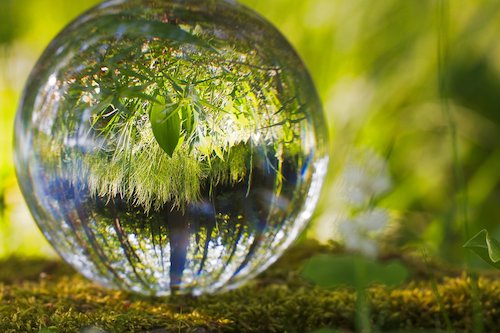Sustainability: In the Business of Change
Over the past years, we have worked to align ourselves as one company and define ourselves within our industry as leaders in sustainable practices. Measuring ourselves against past performance as well as industry sustainability goals is critical for not only our business, but also for our employees, our customers, our communities, and our planet.

As a member of AF&PA, Hood Container is committed to helping make progress toward AF&PA's Better Practices, Better Planet 2030 sustainability goals. AF&PA has established five quantifiable sustainability goals that the industry aims to meet by 2030. These goals include reducing greenhouse gas emissions, advancing a circular value chain, striving for zero workplace injuries, helping drive water stewardship, and advancing more resilient U.S. forests.
Hood Container’s own 2030 goals helps us measure our progress and stay aligned with industry goals and solidify our commitment to a more sustainable future.
-

Reduce Green House Gas Emissions
-

Advance a Circular Value Chain
-

Strive for Zero Injuries
-

Advance Water Management
-

Advance More Resilient US Forest
 Reduce Green House Gas Emissions
Reduce Green House Gas Emissions
Based on the AF&PA Better Planet Practices Better Planet 2030 Targets, which include a baseline of 2005, HCC Mill Division has decreased CO2 emissions by 14%. Hood Container Mill Division currently tracks Scope 1 emissions and reports that data to the EPA. The American Fiber and Packaging Association is working on establishing industry goals by 2025 for relevant Scope 3 emissions.
*Scope 1 emissions are direct greenhouse gas (GHG) emissions that come from sources that an organization owns or controls. Scope 3 emissions are greenhouse gases that are a result of activities that an organization indirectly impacts as part of its value chain, but that are not owned or controlled by the organization.
 Advance a Circular Value Chain
Advance a Circular Value Chain
Hood Container sources wood from managed forests that produce a perpetual harvest. Additionally, 91% of containerboard produced in the US is recyclable. Over the last 11 years we have increased the use of recycled fiber by 74% in our mills. Since inception, our mill division has supported local education opportunities within the communities in which we operate. As we move forward towards 2030, Hood Container is continuing to look for ways to increase recycle fiber usage and support the reclamation of recycled corrugate in the marketplace. Our box plants are focused on producing boxes that meet performance standards with less fiber being used and are focused on waste reduction. We also provide wax alternative options.
 Strive for Zero Injuries
Strive for Zero Injuries
Hood Container utilizes our existing processes to drive engagement company-wide to reduce at risk behaviors and unsafe conditions. We promote a culture that is engrained in educating, learning, and practicing safe habits that protect our team members everyday. Hood Container participates in a voluntary program through AF&PA to prevent serious injuries and fatalities (SIFs). Not only has Hood Container continued to lower our injury rate below the industry average, but endeavors to promote AF&PA’s aspirational goal striving for zero injuries through our daily practices. On our journey to continuously improve our injury rate we have put in place a 2030 goal of 1.0 TIR.
 Advance Water Management
Advance Water Management
Since our inception, Hood Container’s intention has been to use our national resources in a sustainable way. We have continued to make progress on reducing our water usage and recently achieved our 2025 goal in 2023. As we look forward to 2030, we will continue to seek improvements to exceed the industry average with our water usage reduction goal to 9,800 gallons per ton.
 Advance More Resilient US Forest
Advance More Resilient US Forest
While Hood Container owns no timberland, we are actively involved in educating private landowners on the importance of Sustainable Forestry. In support of advancing a more resilient US forest, we continue the principles and activities outlined by our participation in Sustainable Forestry Initiative® (SFI®) and Forest Stewardship Council® (FSC®). We are heavily focused on our efforts to improve wood yield at both mills. Additionally, we will continue to provide transparency with regards to timber sourcing.
Sustainability has always been at the core of who we are as an organization and as an industry of renewable resources.
 - Greg Hall, President & COO
- Greg Hall, President & COO
The Life Cycle of A Box
-
The United States plants 3.2 million seedlings each day, meaning that three seedlings are planted to every tree harvested. By planting these young trees, the paper industry has a perpetual supply of raw materials, unlike mining, oil, and gas who have limited natural resources.
-
Young trees are more efficient at converting CO2 into oxygen and have a positive environmental impact. HCC Mill Division is both SFI® and FSC® certified. This means that our suppliers adhere to the highest standard for forestry stewardship and we use 100% wood fiber procurement from chain of custody.
-
Our mills receive about 60 truckloads per day of sawdust and waste wood from sawmills and landfills to be used as sustainable fuel for our process.
-
Focused on transportation efficiency, we optimize shipping schedules to reduce miles and fuel consumption by our trucks hence reducing greenhouse gas emissions.
-
Our manufacturing processes are continually monitored for opportunities to reduce waste. We also utilize water-based inks that contain no solvents or heavy metals, more-efficient natural gas for boilers, maintain low (VOC) Volatile Organic Compounds, and are converting to 50% natural organic resin glue.
-
Our corrugated facilities utilize right-sizing boxes, where we use the latest software and board combination to provide box strength with the least amount of fiber. We are also Amazon APASS certified.
-
Between our professional truck drivers and our facility locations, we can distribute to most of the US market in less than one day.
-
From Mill to Market we exercise every opportunity to increase efficiencies and not only provide our customers with speed to market but also top line product.
-
We understand that providing quality sustainable packaging solutions are important to our customers because they are important to consumers.
-
Corrugated products are the most recycled packaging material. 93% of corrugated containers are recovered/ recycled (3 years average). Hood Container is an active recycler of Old Corrugated Containers (OCC). Our mills recycle, on average, about 360,000 tons per year of post-retail and post-consumer waste.
-
Our mills receive up to 40 truckloads a day of baled post-consumer Old Corrugated Containers from grocery stores and recycling facilities. Since 2014 HCC has increased use of recycled fiber by 74%.

Where Environmental Stewardship Takes Root
The Hood Container Corporation Mill Division is committed to adhering to the letter, and the spirit, of all environmental regulations. In the history of the company, there have been zero Notice of Violations. The division is SFI® and FSC® certified. This means that our suppliers adhere to the highest standard for forestry stewardship, and best management practices for timber production and harvesting. Both mills are recertified annually for this important designation.
The Power of Green
The Paper Industry has long been a preeminent participant in the Sustainability of Our Planet. There are three areas where our industry excels:
- First, the use of trees as a raw material allows for the consumption of Carbon Dioxide and the respiration of oxygen as an outcome of the tree’s growth process. The domestic Paper Industry has historically planted 4 trees for every tree harvested thus enhancing the consumption of the greenhouse gas, carbon dioxide in exchange for oxygen.
- About 50% of all corrugated boxes are made with papers that are recycled. Hood Container Corp’s linerboard and medium papers are close to this percentage.
- The Paper Industry has and continues to invest in equipment that allows the boxes it produces to comply with DOT requirements for Interstate commerce with less and less fiber in the box. This source reduction approach to sustainability goes a step further than just utilizing recycled fibers since carbon emissions from this approach are far less than even with the recycled papers approach. Hood Container’s papers are almost 100% source reduced packaging materials.
Our paper mills generate the majority of their energy with green fuels. This means using bark and sawdust for boiler fuel and using lignin from the pulping process to generate steam and electricity. The whole tree is used in the pulp and papermaking process, no waste.
Our Corrugated facilities utilize Right-sizing boxes, where we use the latest software and board combination to provide box strength with the least amount of fiber. Our Converting plants have transitioned fuel for their boilers from oil to more-efficient natural gas. Many plants have reduced their power needs by converting to low-wattage LED lights. We also focus on transportation efficiency using optimized shipping schedules to reduce miles and fuel consumption by our trucks hence reducing greenhouse gas emissions.
Many of our corrugated facilities also focus on making Green Choices including:

- Utilizing water-based inks that contain no solvents or heavy metals
- Employing renewable natural resources
- Maintaining low (VOC) Volatile Organic Compounds
- Identifying and implementing increased manufacturing efficiencies
- Converting to 50% natural organic resin glue
- Classifying capital expenditures that are aimed at achieving improved energy and water usage
- Capturing and returning scrap to paper mills for recycling
- Leveraging refurbished pallets when applicable

